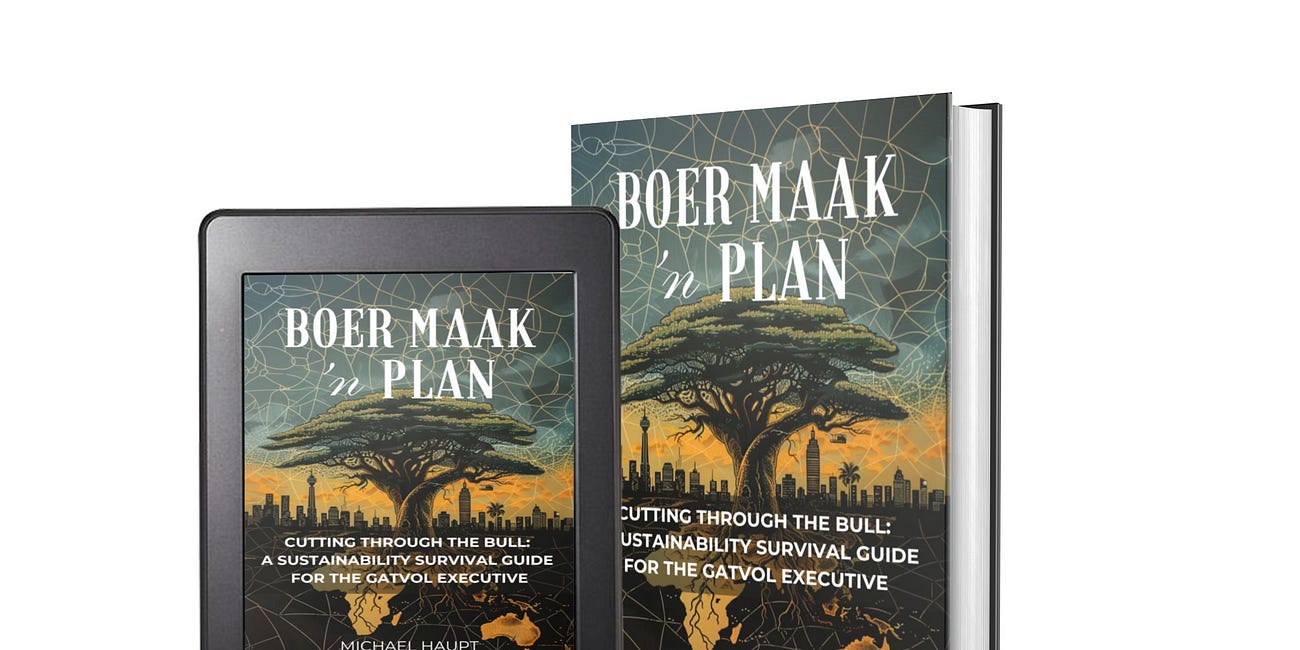Professor Eelco H. Dykstra, M.D.
Chairperson, Daily Impact Emergency Management (DIEM) Network, The Hague
Visiting Professor, Centre of Excellence: Adaptation and Resilience
University of South Africa (UNISA)
https://www.linkedin.com/in/eelco-h-dykstra-94534a7/
It is with great enthusiasm that I introduce "Boer Maak 'n Plan—Cutting Through the Bull: A Sustainability Survival Guide for the Gatvol Executive" by Michael Haupt. This groundbreaking book comes at a pivotal moment for the Southern African region and the world, as we confront the urgent need to build resilience in the face of mounting ecological, economic, and social challenges.
Drawing upon my extensive experience in international emergency management, I have long advocated for a whole-of-society approach to resilience-building. This holistic perspective recognises that true sustainability and adaptability cannot be achieved through top-down government interventions alone, but require the active engagement and leadership of the private sector, civil society, and local communities. It is precisely this inclusive, multi-stakeholder vision that Michael Haupt articulates so compellingly in these pages.
One of the book's central themes is the critique of mainstream sustainability frameworks such as Environment, Sustainability, Governance (ESG) reporting and the UN Sustainable Development Goals (SDG). While well-intentioned, these approaches too often devolve into greenwashing exercises that fail to address the root causes of our societal vulnerabilities. Haupt rightly argues that incremental, box-ticking measures are insufficient to catalyse the profound transformation required to secure South Africa's future, and indeed, that of the entire world. Instead, he proposes a bold paradigm shift towards bioregional regeneration, in which corporations partner with rural communities to revitalise degraded landscapes and cultivate localised, self-sustaining economies.
At the heart of Haupt's thesis is an analysis of the broader historical forces shaping our current predicament. He then presents an emergent worldview that recognises the fundamental interconnectedness of all life and the need for economic systems that regenerate rather than exploit the Earth's living systems. Haupt further argues that South African business leaders have the opportunity and responsibility to pioneer this new paradigm, leveraging their ingenuity and resourcefulness to catalyse a more resilient, equitable, and ecologically attuned economy.
Beyond its implications for corporate sustainability and societal resilience, Boer Maak 'n Plan also holds the potential to fundamentally redefine South Africa's global brand. Like other countries, South African businesses have an extraordinary opportunity to project a new national identity—one synonymous with the vanguard of the global regenerative movement. In this way, Haupt's book is not only a roadmap for corporate transformation but also a catalyst for reimagining South Africa's role and reputation on the international stage.
This place-based, collaborative model also resonates deeply with the mission and objectives of DIEM and the newly launched Centre of Excellence: Adaptation and Resilience at UNISA. As a pioneering academic institution dedicated to advancing cutting-edge research, education, and community engagement in the field of resilience, we recognise the immense potential of Haupt's vision to inform and accelerate our work. The bioregional strategies outlined in the book provide a concrete roadmap for translating academic insights into tangible, on-the-ground impact.
In particular, the book's call for a network of Bioregional Learning Centers across South Africa aligns perfectly with the Centre of Excellence's aspirations to catalyse transformative change through knowledge-sharing, capacity-building, and participatory action research. By establishing these decentralised hubs of innovation and experimentation, we can leverage the unique strengths and resources of each region to co-create context-specific solutions for resilience. This distributed, adaptive approach is essential for a country as geographically and culturally diverse as South Africa.
As Haupt astutely observes, two of South Africa's most pressing vulnerabilities are food insecurity and the erosion of social cohesion, both exacerbated by the hunger crisis afflicting far too many of our communities. Addressing these interlinked challenges will require a fundamental rethinking of our food systems, moving away from industrial monocultures and global supply chains towards regenerative, locally-rooted agricultural practices. The book's emphasis on reviving traditional ecological knowledge and empowering smallholder farmers offers a promising pathway towards greater food sovereignty and social solidarity.
Ultimately, what makes "Boer Maak 'n Plan" such an important contribution is its unwavering faith in the resilience and ingenuity of the South African people. Haupt captures the indomitable spirit of "making a plan" that has carried South Africa through countless trials and tribulations and channels it into a clarion call for collective action. By harnessing the dynamism of the private sector, our communities' wisdom, and our youth's passion, we can chart a course towards a thriving, regenerative future for all South Africans.
It is my sincere hope that this book will serve as a catalyst for the kind of audacious thinking and collaborative innovation needed to realise this vision. May it inspire a new generation of resilience leaders across all sectors of society, united in their commitment to the long-term well-being of Africa and her people. As all of us, including the DIEM Network and the Centre of Excellence for Adaptation and Resilience, continue to advance this vital agenda, this publication, "Boer Maak 'n Plan", can serve as a most valuable guide and companion.
Professor Eelco H. Dykstra, M.D.
The Hague, Netherlands
May 2024
Boer Maak 'n Plan—Table of Contents
Foreword Introduction Part 1 - The Past: Patterns of Civilisational Cycles Part 1 Introduction Chapter 1 - Barbarians at the Gate: Defending South Africa's Resilience in an Age of Globalisation Chapter 2 - The Impact of Concentrated Financial Influence on Global Systems






Due to the local focus, it feels quite out of my range of priorities to read it right away – but I didn't even know you're writing on this, and I am excited to to see it hitting the road!
Curious about the distribution:
This is (sensibly) targeted toward small group of probably hard-to-reach people (at least through broader media channels) that nonetheless might be best advised to give this a read in order to see a bigger picture and synchronize efforts.
Is there any kind of already-established infrastructure reaching the executive level in SA that you can leverage?
Cheering on this effort from another continent, you're prolific.